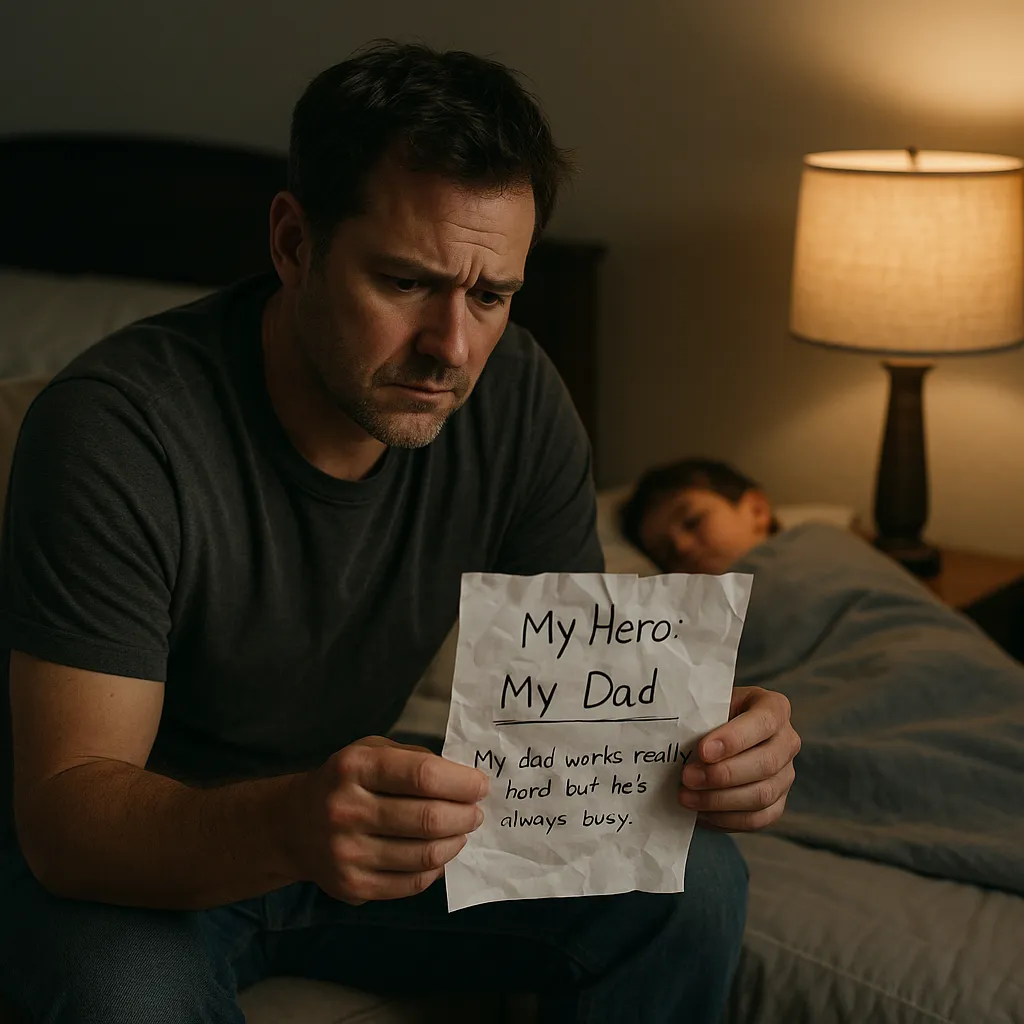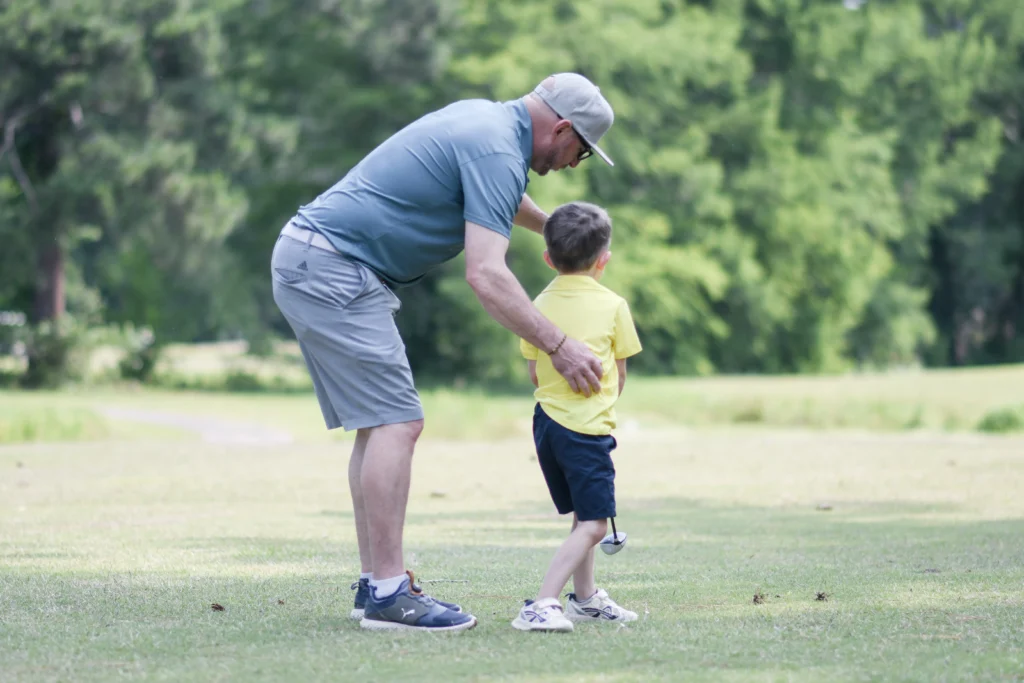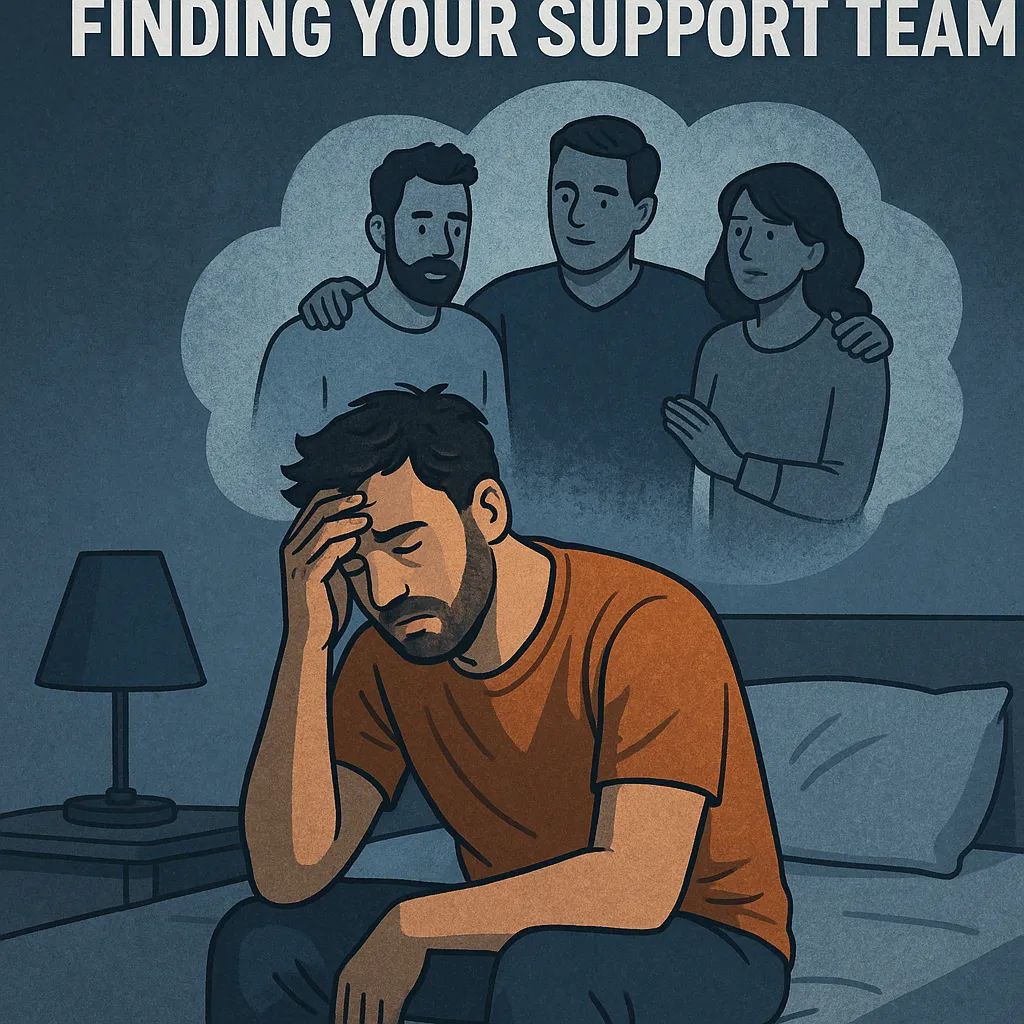The Silent Crisis: Why Present Fathers Are Becoming Extinct (And How to Fight Back)
It’s 8:47 PM. Your daughter’s bedroom door is cracked open, and you can hear her whispering to her stuffed rabbit about her day at school. Twenty feet away, you’re scrolling through work emails, promising yourself “just five more minutes” before tucking her in.
But we both know how this story ends, don’t we?

The Moment Everything Changed
Last Tuesday, Jake thought he was crushing it as a dad. His 7 year old son had everything he needed. New soccer cleats, the latest gaming system, a college fund that was steadily growing. Jake worked 60 hour weeks to make it all happen.
Then came the school project.
“Dad, I have to write about my hero,” his son announced over breakfast. “Can you help me tonight?”
“Of course, buddy. Right after dinner.”
But dinner turned into client calls. Client calls turned into urgent emails. By the time Jake looked up, it was past 10 PM, and his son was already asleep.
The next morning, Jake found a crumpled paper in the trash. At the top, in his son’s careful handwriting: “My Hero: My Dad.” Below it, a single sentence: “My dad works really hard but he’s always busy.”
That’s when Jake realized he wasn’t the hero of his son’s story. He was the absent character who showed up in the credits.
The Hidden Problem: Physically Present, Emotionally Absent Fathers
Here’s a fact that should scare every father reading this: 40% of children say their fathers are “physically present but emotionally unavailable.” These aren’t kids from broken homes or single parent households. These are children whose dads come home every night, sit at the dinner table, and tuck them in. Yet somehow they remain strangers.
We’ve created a generation of “ghost dads.” Men who haunt their own homes, visible but not truly there.
The Price of Distracted Fatherhood
Dr. Sarah Chen is a child psychologist at Stanford. She puts it bluntly: “Children don’t see the difference between a father who’s absent and a father who’s present but not paying attention. To them, both feel like abandonment.”
The numbers back her up: • Children with emotionally distant fathers are 3 times more likely to struggle with anxiety • They’re 2 times more likely to have trouble forming relationships as adults • 67% say they felt “unimportant” or “not valued” during childhood
But here’s what the research doesn’t capture: the devastating impact on the fathers themselves.

When Success Feels Like Failure
Mark worked his way up from a construction site to corner office. He gave up weekends and family dinners along the way. He thought he was building a legacy for his two daughters.
Instead, he built a wall.
“I remember the day my 12 year old looked at me and said, ‘Dad, you don’t even know me,'” Mark says, his voice still heavy with regret. “And she was right. I knew her shoe size and her teacher’s name, but I didn’t know her fears, her dreams, or what made her laugh until her stomach hurt.”
This is the cruel twist of modern fatherhood: we work ourselves into the ground trying to provide for our children, only to wake up one day and realize we’ve given them everything except the one thing they needed most. Us.
The False Promise of Money Over Time
Somewhere along the way, we bought into a lie. We started believing that love could be measured in dollars earned, hours worked, and things purchased. We confused providing for our families with providing to our families.
But children don’t speak the language of sacrifice. They speak the language of presence.

The Golf Course Wake Up Call
Tom learned this lesson on the 18th hole of his local course. He’d been playing alone (as usual) when he noticed a father and son ahead of him. The kid couldn’t have been more than eight, and his swing looked more like he was swatting flies than hitting golf balls.
“They’re holding up the whole course,” Tom muttered to himself.
But then he watched closer. After each terrible shot, the father would kneel down, adjust his son’s grip, and offer gentle words. When the ball finally rolled into the hole after six attempts, both father and son celebrated like it was the Masters Tournament.
Tom realized he hadn’t seen his own teenage son smile like that in years.
That’s when it hit him: presence isn’t about being perfect. It’s about joining in.
What Makes a Present Father
What does it actually mean to be a present father? It’s not about being perfect or having all the answers. It’s not about never working late or never feeling stressed.
Present fathers share three important qualities:
1. Focused Attention
Present fathers understand that attention is how we show love. When they’re with their children, they’re with their children. Phones go away. Work talk stops. Eye contact happens.
Research from the University of Washington shows that children can spot “fake attention” as early as age 3. They know when you’re going through the motions versus when you’re truly there.
2. Emotional Connection
This means being willing to enter your child’s emotional world, even when it’s messy or doesn’t make sense. It means accepting feelings instead of immediately trying to fix problems.
When your 6 year old melts down because her toast broke, a present father doesn’t say, “It’s just toast.” He says, “You’re really upset that your toast broke. That’s frustrating.”
3. Showing Up Regularly
Presence isn’t a grand gesture. It’s a daily choice. It’s showing up for the small moments that, looking back, turn out to be the big moments.

The Amazing Effect: How Present Fathers Change Everything
When a father commits to true presence, the change isn’t just big. It lasts for generations.
For Children: Building Rock Solid Confidence
Children with present fathers develop what psychologists call “secure attachment.” This is the core belief that they are worthy of love and attention. This becomes the foundation of their self worth for life.
Emma’s story shows this perfectly. At 16, she was struggling with anxiety and self doubt. Everything changed when her father, David, started what he called “phone free Sundays.”
“Every Sunday, Dad would put his phone in a drawer and we’d spend the day together. Sometimes we’d hike, sometimes we’d cook, sometimes we’d just talk. But for six hours, I had his complete attention,” Emma remembers. “Those Sundays taught me that I was worth someone’s full time and focus.”
For Partners: Rebuilding Trust and Connection
When fathers become present with their children, it creates space for deeper closeness with their partners. The mother no longer feels like she’s parenting alone, and the father stops feeling like an outsider in his own home.
For Men Themselves: Finding Peace in the Chaos
Perhaps most surprisingly, present fathers report much lower levels of stress and worry. Why? Because presence creates connection, and connection fights loneliness.
“I used to come home exhausted and overwhelmed,” says Michael, father of three. “Now I come home to connection. My kids help me reset, not stress me out more.”
What Gets in the Way (And How to Get Past It)
Let’s be honest about what stands between fathers and presence:
The Pressure to Provide
The weight of money worries can feel crushing. But here’s what present fathers understand: your children need your presence more than your presents.
This doesn’t mean forgetting about money. It means finding the balance where providing and being present work together.
The Always On Culture
We live in a world that demands we’re always available. Present fathers learn to create boundaries. Sacred spaces where family time is protected time.
The Fear of Not Being Enough
Many fathers avoid emotional closeness with their children because they’re afraid of saying the wrong thing or not having the right answers. Present fathers embrace the truth: your children don’t need a perfect father. They need a present one.
The Step by Step Path to Presence: Your 30 Day Challenge
Becoming a present father isn’t about changing your entire life overnight. It’s about making small, steady changes that add up over time.
Week 1: The Phone Break
Challenge: Put your phone in another room for the first 30 minutes after you come home.
This simple act tells your family (and yourself) that they are your priority. Use this time for what researcher Dr. John Gottman calls “the six minute connect.” Six minutes of full attention with each family member.
Week 2: The Listening Revolution
Challenge: Ask one meaningful question each day and listen to the complete answer without interrupting or giving advice.
Questions that work: • “What was the best part of your day?” • “What’s something you’re looking forward to?” • “If you could change one thing about today, what would it be?”
Week 3: Create Special Times
Challenge: Start one weekly tradition that belongs only to you and your child.
This could be Saturday morning pancakes, bedtime stories, or a weekly walk around the neighborhood. The key is doing it every time. This becomes your child’s emotional safe place.
Week 4: The Honesty Practice
Challenge: Share one age appropriate struggle or feeling with your child each week.
This might sound wrong, but children need to see their fathers as human. When you share that you had a tough day at work or felt nervous about a presentation, you give your child permission to be imperfect too.

When the Weight Becomes Too Much: Finding Your Support Team
Here’s something no one talks about: becoming a present father can feel overwhelming at first. When you start truly connecting with your children’s emotional worlds, you might feel unprepared or not good enough.
That’s normal. And that’s where community becomes crucial.
The Power of Shared Stories
Sometimes, the path to presence begins with understanding you’re not alone in the struggle. That’s where resources like Golf Ball Wisdom become priceless. Not because they offer easy answers, but because they offer shared experiences.
Reading stories of other fathers who’ve walked this path, who’ve struggled with the same questions and fears, can give you the push you need to take the next step.
Professional Support When You Need It
But sometimes, stories aren’t enough. Sometimes you need practical tools, professional help, or even just someone to talk to at 2 AM when being a father feels too hard.
That’s where Men’s Mental Caddie steps in. It offers everything from mental health resources to AI powered support when you need guidance but don’t know where to turn.
Think of it as having a helper for the most important game you’ll ever play: fatherhood.
The Legacy You’re Actually Building
Five years from now, your children won’t remember the specific toys you bought them or the exact number of hours you worked. But they will remember the evening you sat on the floor and built Legos with them for two hours straight. They’ll remember the Saturday morning you taught them to make scrambled eggs. They’ll remember the night you stayed up late because they needed to talk through a friendship problem.
These moments, the ones that might feel small to you, these are the moments that shape who they become.
The Choice That Changes Everything
Right now, you’re standing at a crossroads that every father faces. You can continue down the path of good intentions and missed moments, or you can choose the harder but infinitely more rewarding path of presence.
The choice isn’t between being a provider and being present. It’s between being a father who works for his family and being a father who works with his family.
Your children are waiting. Not for you to be perfect, but for you to be present.
The question is: are you ready to show up?
Frequently Asked Questions
What does it mean to be a present father?
Being a present father means giving your full attention, emotional connection, and steady engagement when you’re with your children. It’s about quality of connection rather than quantity of time spent in the same room.
How can I balance work demands with being present for my children?
Start with boundaries. Pick specific times as “family time” and protect them like you would an important business meeting. Even 30 minutes of full attention daily can make a huge difference.
What if I feel overwhelmed by my children’s emotions?
This is normal and common. You don’t need to fix every emotion or have all the answers. Sometimes presence means simply accepting feelings: “I can see you’re really upset about this. That must be hard.”
How do I know if I’m being present enough?
Look for signs of connection: Do your children come to you for comfort? Do they share both good and bad news with you? Do they seem comfortable being themselves around you? These are better signs than time spent.
What’s the difference between being physically present and emotionally present?
Physical presence is being in the same space. Emotional presence is being mentally and emotionally available. Making eye contact, actively listening, responding to emotional needs, and being fully engaged in the moment.
Can I become a more present father if I work long hours?
Absolutely. Presence is about quality, not quantity. A father who works 60 hours a week but gives full attention during family time can be more present than a father who’s home all day but constantly distracted.
How do I handle guilt about past missed moments?
Focus on moving forward rather than dwelling on regret. Children forgive easily and adapt well. Start being present today, and don’t let guilt about yesterday stop you from showing up tomorrow.
What if my teenager seems to push me away?
This is normal for their age, but it doesn’t mean stopping your attempts at connection. Teenagers often test whether you’ll keep showing up even when they’re difficult. Being consistent in offering presence (even when rejected) builds trust over time.
How can other fathers support my journey toward presence?
Connect with fathers who share similar values through communities like Golf Ball Wisdom for stories and encouragement, or Men’s Mental Caddie for practical tools and professional support.
What’s the long term impact of being a present father?
Children with present fathers typically develop stronger self esteem, better emotional control, and healthier relationships throughout life. Present fathers also report greater life satisfaction and stronger family bonds that last well into their children’s adulthood.
Your presence is the greatest gift you can give your children and yourself. Start today, start small, but start. They’re waiting for you to show up.
